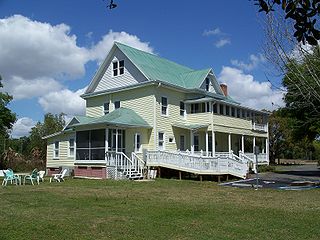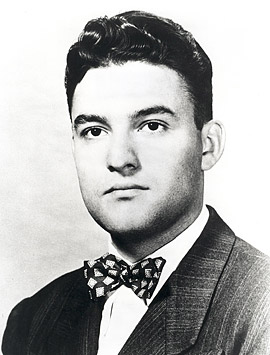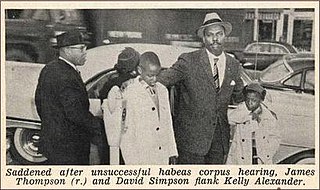
The Ku Klux Klan, commonly shortened to the KKK or the Klan in recent decades, is an American white supremacist, right-wing terrorist, and hate group whose primary targets are African Americans, Jews, Latinos, Asian Americans, Native Americans, and Catholics, as well as immigrants, leftists, homosexuals, Muslims, atheists, and abortion providers.
The Southern Poverty Law Center (SPLC) is an American 501(c)(3) nonprofit legal advocacy organization specializing in civil rights and public interest litigation. Based in Montgomery, Alabama, it is known for its legal cases against white supremacist groups, for its classification of hate groups and other extremist organizations, and for promoting tolerance education programs. The SPLC was founded by Morris Dees, Joseph J. Levin Jr., and Julian Bond in 1971 as a civil rights law firm in Montgomery. Bond served as president of the board between 1971 and 1979.

Groveland is a city in Lake County, Florida, United States. The population was 8,729 at the 2010 census. Between 2000 and 2010, Groveland's population increased by 189%, making it the fastest growing place in Florida. However, its land area increased more than fivefold due to annexation. It is located at the intersection of State Road 19 and State Road 33/50.

Columbia is a city in and the county seat of Maury County, Tennessee. The population was 41,690 as of the 2020 United States census. Columbia is included in the Nashville metropolitan area.
The Deacons for Defense and Justice was an armed African-American self-defense group founded in November 1964, during the civil rights era in the United States, in the mill town of Jonesboro, Louisiana. On February 21, 1965—the day of Malcolm X's assassination—the first affiliated chapter was founded in Bogalusa, Louisiana, followed by a total of 20 other chapters in this state, Mississippi, Arkansas, and Alabama. It was intended to protect civil rights activists and their families, threatened both by white vigilantes and discriminatory treatment by police under Jim Crow laws. The Bogalusa chapter gained national attention during the summer of 1965 in its violent struggles with the Ku Klux Klan.

The NAACP Legal Defense and Educational Fund, Inc. is a leading United States civil rights organization and law firm based in New York City.

Fuller Warren was an American attorney and politician who served as the 30th governor of Florida.

Jack Greenberg was an American attorney and legal scholar. He was the Director-Counsel of the NAACP Legal Defense Fund from 1961 to 1984, succeeding Thurgood Marshall.

The Montgomery Advertiser is a daily newspaper and news website located in Montgomery, Alabama. It was founded in 1829.

Harry Tyson Moore was an African-American educator, a pioneer leader of the civil rights movement, founder of the first branch of the National Association for the Advancement of Colored People (NAACP) in Brevard County, Florida, and president of the state chapter of the NAACP.

Willis Virgil McCall was sheriff of Lake County, Florida. He was elected for seven consecutive terms from 1944 to 1972. He gained national attention in the Groveland Case in 1949. In 1951, he shot two defendants in the case while he was transporting them to a new trial and killed one on the spot. Claiming self-defense, he was not indicted for this action. He also enforced anti-miscegenation laws and was a segregationist.
Walter Lee Irvin, a United States Army veteran of World War II, was one of the so-called Groveland Four—four young African-American men of Lake County, Florida who, in a racially charged case, were accused of raping and assaulting a white woman. Three of the young men were convicted: Irvin was sentenced to death, as was another of the defendants; the third, a minor, was sentenced to life in prison. The fourth had fled after being accused, but a few days later and 200 miles away, was found by a posse of 1,000 white men who, on July 26, 1949, shot him over 400 times while he was asleep under a tree. No one was arrested for his murder.

Zephaniah Alexander Looby was a lawyer in Nashville, Tennessee, who was active in the civil rights movement. Born in the British West Indies, he immigrated to the United States at the age of 15; he earned degrees at Howard University, Columbia University Law School and New York University.
The Groveland Four were four African American men, Ernest Thomas, Charles Greenlee, Samuel Shepherd, and Walter Irvin. In July 1949, the four were accused of raping a white woman and severely beating her husband in Lake County, Florida. The oldest, Thomas, tried to elude capture and was killed that month. The others were put on trial. Shepard and Irvin received death sentences, and Greenlee was sentenced to life in prison. The events of the case led to serious questions about the arrests, allegedly coerced confessions and mistreatment, and the unusual sentencing following their convictions. Their incarceration was exacerbated by their systemic and unlawful treatment—including the death of Shepherd, and the near-fatal shooting of Irvin. Greenlee was paroled in 1962 and Irvin in 1968. All four were posthumously exonerated by the state of Florida in 2021.
Thurgood Marshall High School is a public high school in Dayton, Ohio. The school is named for the late African American pioneering civil rights attorney and Supreme Court Justice Thurgood Marshall. The school was established in 2007.

The Kissing Case is the arrest, conviction and lengthy sentencing of two prepubescent African-American boys in 1958 in Monroe, North Carolina. A white girl kissed each of them on the cheek and later told her mother, who accused the boys of rape. The boys were then charged by authorities with molestation. Civil rights activists became involved in representing the boys. The boys were arrested in October 1958, separated from their parents for a week, beaten and threatened by investigators, then sentenced by a Juvenile Court judge.
Cordie Cheek was a 17-year-old African-American youth who was lynched by a white mob in Maury County, Tennessee near the county seat of Columbia. After being falsely accused of raping a young white girl, Cheek was released from jail when the grand jury did not indict him, due to lack of evidence. The county magistrate and two other men from Maury County abducted Cheek from Nashville, where he was staying with relatives near Fisk University, took him back to the county, and turned him over to a lynch mob. The mob mutilated the youth and murdered him by hanging.

Gilbert Anthony King is an American writer and photographer. He is known best as the author of Devil in the Grove: Thurgood Marshall, the Groveland Boys, and the Dawn of a New America (2012), which won the Pulitzer Prize. His previous history was The Execution of Willie Francis: Race, Murder, and the Search for Justice in the American South (2008) and his most recent is Beneath a Ruthless Sun: A True Story of Violence, Race, and Justice Lost and Found (2018).

Arc of Justice: A Saga of Race, Civil Rights, and Murder in the Jazz Age is a 2004 book by historian Kevin Boyle, published by Henry Holt. The book chronicles racism in Detroit during the 1920s Jazz Age through the lens of Ossian Sweet, an African American doctor who moves to Detroit during the great migration. While living in Detroit he eventually moves out of the ghetto and he and his wife move into an all-white middle-class neighborhood. When racist whites attack the Sweets' home, a white man is killed. Sweet and his family are persecuted by the legal system.
Mabel Norris Reese was a civil rights activist and journalist, editor and owner of the Mount Dora Topic newspaper from 1947 to 1960. A book written about the NAACP's defense of the Groveland Four by Gilbert King won the Pulitzer Prize and discussed her mixed reporting on that event. Her induction into the Lake County, Florida Women's Hall of Fame and subsequent commemoration with a bust by sculptor Jim McNalis in 2020 memorialized the crusading journalist's fight against the Ku Klux Klan. Devil in the Grove was a non-fiction book about the 4 Groveland African-American youths accused of the rape of a white woman in 1949. The Groveland Four were pardoned by Gov. Ron DeSantis in January 2019.













